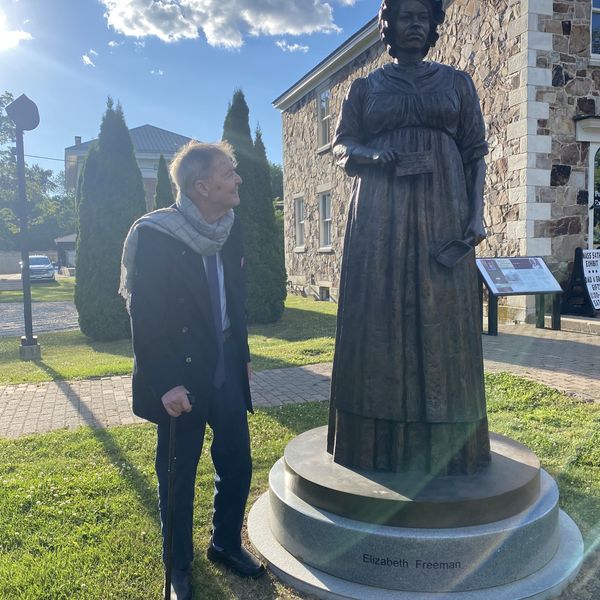An old Ukrainian was being interviewed by cable and said his name, which apparently in Russian is like John Doe. He said he was hungry. The cable people gave him food.
I grew up in Chicago, with Russians and Poles on one side and Poles and Ukrainians on the other. The Russian May Romashko would give us a pot of borscht every week. I can taste it now and love it to this day.
I used to cut the lawn of the old Ukrainian woman, her tiny plot of grass earning me 50 cents.
A block down from the Art Institute in downtown Chicago is Russian Teatime, run by Ukrainians. Borscht as well. Black bread from the Black Sea. Stolichnaya iced. Made in Finland. I have two.
The Foreign Minister of Ukraine, Dymitro Kolebo, who could not be more dapper, catch the pocket squares, said what Ukraine needs is very simple. “Weapons, weapons, weapons.”
(How is it that every member of the Ukrainian Parliament, although heavily accented, speaks better idiomatic English than I do?)
The Russian spokesman, Tovarishch Peskov, acknowledged that the Russians had suffered significant losses, a strange admission, and will he get his head handed to him on a platter?, no, because he will blame the losses on the Ukrainians, and that Bucha was filled with staged atrocities. Didn’t we see the bodies moving? No, we did not.
I’ve been in drama classes where I have been told to be a tree, but a dead person with my hands tied behind me and a bullet hole in the back of my head? Even the acting method known as The Method, invented by the Russian theater director, Konstantin Stanislavsky, as he travestied Chekhov’s plays, staging them lugubriously, when Anton, the Gentle Doctor called them comedies, didn’t go that far.
Pootie Poot’s two daughters, there seems to be a third slithering around, have been sanctioned. They look like Slavic versions of the Kardashians.
And Foreign Minister Sergei Lavrov, who tosses around the term “de-Nazify” when defending the Russian invasion, finds his wife and daughter sanctioned as well.
But what good will these sanctions do? All these kakocrats have so much foreign currency piled around the globe that I fear they will never run out of the filthiest of lucre.
And what about the gentle Russians? Where are they? I am certain they are somewhere. They are not putting bullets in the backs of innocent heads with their hands tied behind them, and when will they come to the fore?
(Da, Alexsei Novalny, Pootie’s strongest foe, has just been given another nine years in the Siberian gulag.)
And Fyodor Dostoyevsky in “Crime and Punishment” with the young man Raskolnikov, which a Russian woman told me means “shattered glass”, who kills an old woman just to see what it’s like and then is haunted non-stop by his deed. Will these war-criminal soldiers be so haunted?
My colleagues Albert Innaurato and Christophe4 Durang wrote a brilliant farce “The Idiots Karamazov”, for the Yale Rep, with the then unknown Meryl Streep playing the bowdlerizing translator Constance Garnett in her wheelchair, as the characters sang and danced, “O, we got to get to Moscow, ya da da da…”
Do we? Mikhail Bulgakov’s novel “The Master and Margarita” has the Master (the Devil) visiting God-less Moscow. Today, no visit is necessary.
And where is Doctor Chekhov, the gentlest of playwrights?
One of his most famous characters, Masha, in “The Three Sisters,” opens with — I am in mourning for my life.
The defiant Ukrainians and their fierce comic-now President Zelenskyy, know exactly what she means, but will not take NYET for an answer.
Lonnie Carter is a writer who lives in Falls Village. Email him at lonniety@comcast.net. or go to his website at www.lonniecarter.com.















In mourning for life